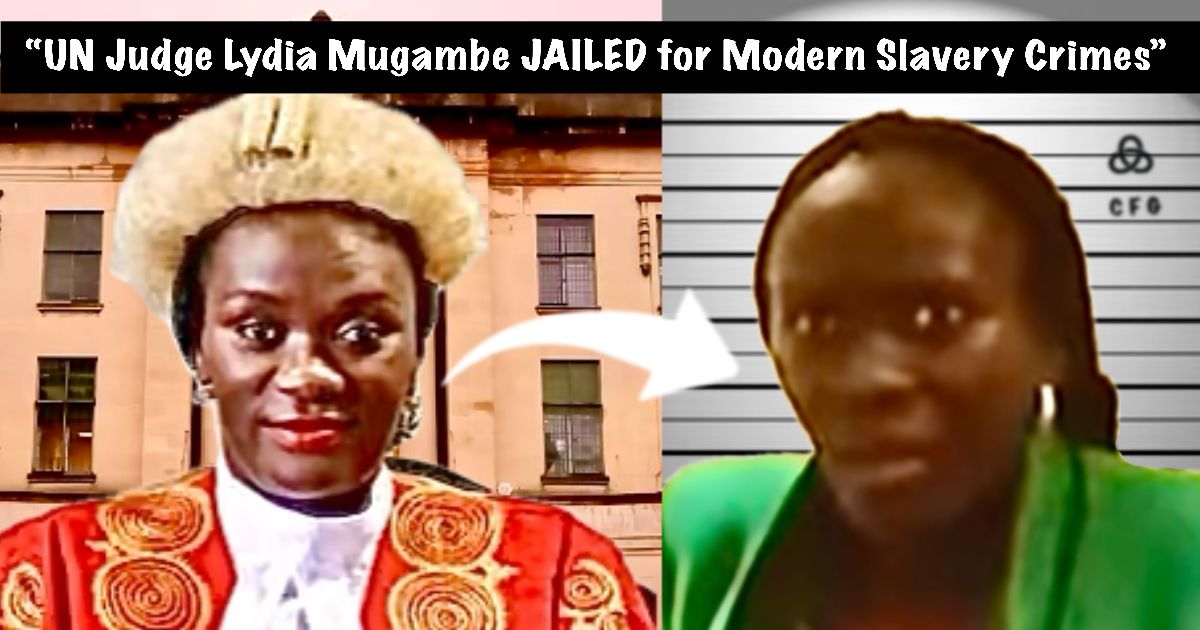Judge Mugambe Jailed for UK Modern Slavery Offences
A top UN and High Court judge has fallen from grace as Lydia Mugambe is jailed for modern slavery in a shocking abuse of power behind closed Oxford doors.
A former United Nations judge has been sentenced to six years and four months' imprisonment after being convicted of multiple offences arising from a prolonged campaign of exploitation, coercion and control over a fellow Ugandan woman whom she brought into the United Kingdom under false pretences.
Lydia Mugambe, 50, who formerly served on the United Nations International Residual Mechanism for Criminal Tribunals and is also a High Court judge in Uganda, was sentenced at Oxford Crown Court by Mr Justice David Foxton, following her conviction on four counts earlier this year. The charges comprised conspiracy to facilitate the commission of a breach of immigration law, arranging or facilitating travel with a view to exploitation, requiring a person to perform forced or compulsory labour, and conspiracy to pervert the course of justice by intimidating a witness.
The offences centred around a vulnerable young Ugandan woman, whose identity is protected, and who was brought to the UK ostensibly to study. The true intention, the court found, was that the woman would work unpaid in Mugambe’s private home, where she was required to carry out domestic chores and provide childcare under duress.
Prosecutor Caroline Haughey KC told the court the woman was “misled and manipulated”, and that Mugambe “used her influence and international standing” to impose servitude, restrict her liberty, and suppress her rights.
Judge Foxton described the case as one of “serious abuse of trust”, stating that Mugambe had “taken advantage of her status in the most egregious way”. He noted the irony that someone with her legal background, who had publicly espoused the protection of human rights, would engage in conduct so fundamentally contrary to the principles she claimed to uphold. The court heard that Mugambe showed no remorse, instead seeking to “blame the victim” for her predicament.
During her arrest in February 2023 by officers from Thames Valley Police, Mugambe was visibly shocked and asserted to officers,
“I am a judge in my country, I even have immunity. I am not a criminal.”
However, the court confirmed that any diplomatic immunity she may have held was explicitly waived by the office of the United Nations Secretary-General, allowing UK authorities to proceed with a full investigation and prosecution. The judge remarked during sentencing that, as a senior jurist with international experience, she would have been fully aware that her immunity was not absolute, and her conduct in attempting to rely on it “lacked credibility.”
The court was told that Mugambe had conspired with Uganda’s then-Deputy High Commissioner to the UK, John Leonard Mugerwa, in a calculated effort to obtain a UK visa for the victim. Mugerwa, who was at the time involved in ongoing legal proceedings in Uganda, is said to have facilitated the woman’s sponsorship via the Ugandan High Commission, while Mugambe offered to approach the judge presiding over Mugerwa’s case — a favour trade described by the prosecution as “highly dishonest.”
Once in the UK, the victim was barred from taking paid employment and subjected to a life of enforced domestic servitude. Her movements were monitored, and she was denied independence. When criminal investigations began, Mugambe engaged in a deliberate attempt to interfere with the course of justice by orchestrating contact with the victim through a religious intermediary and family members in Uganda. The aim, the court found, was to persuade her to withdraw her support for the prosecution and for the charges to be dropped.
The offences for which Mugambe was convicted are as follows:
- 1. Conspiracy to facilitate the commission of a breach of UK immigration law
- 2. Arranging or facilitating travel of another person with a view to exploitation
- 3. Requiring another person to perform forced or compulsory labour
- 4. Conspiracy to pervert the course of justice through intimidation of a witness
The court heard that the victim, now granted asylum in the UK, has a “well-founded fear of persecution” if she were to return to Uganda. Her statement, read in court, described living under “almost constant fear” due to the defendant’s standing and influence in their home country.
In mitigation, Paul Raudnitz KC, appearing for the defence, pointed to Mugambe’s previously “glittering legal career,” citing her role as a respected judge in Uganda and an international jurist. He said she had now resigned from her position with the United Nations and had received support from legal colleagues and members of her community. A small number of supporters were seen outside the court holding placards and chanting slogans in her favour prior to the sentencing hearing.
Nonetheless, the judge found that Mugambe’s conduct warranted a significant custodial sentence. He imposed a six-year and four-month term of imprisonment and also issued a restraining order, prohibiting any direct or indirect contact with the victim indefinitely.
Lynette Woodrow, Deputy Chief Crown Prosecutor and national lead for modern slavery at the CPS, said:
“Lydia Mugambe understood the rule of law and chose to overlook it. The offences committed in this case are grave and demonstrate the profound effect that modern slavery can have on its victims.”
Well, that’s all for now. But until our next article, please stay tuned, stay informed, but most of all stay safe, and I’ll see you then.



